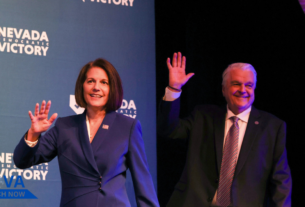TikTok is again available on Apple and Google app stores in the U.S. after the Trump administration delayed its planned ban. The social media app was briefly removed as officials reviewed national security concerns. Users can now download and update the app while negotiations continue.
“This is a temporary win,” a tech analyst said. The delay gives TikTok’s parent company, ByteDance, more time to address U.S. government concerns. Officials say the app’s ties to China pose a potential security risk.
The Trump administration had planned to ban TikTok over fears that the Chinese government could access American user data. ByteDance has denied these allegations, stating that all U.S. data is stored on American servers. Negotiations are ongoing to determine TikTok’s future in the U.S. market.
The decision to delay the ban follows discussions between U.S. officials and TikTok executives. Trump has suggested that banning the app outright could hurt businesses and millions of users. Some lawmakers argue that stronger regulations would be a better solution.
TikTok has over 150 million users in the U.S. Many creators and businesses rely on the platform for income and advertising. A full ban would significantly impact digital marketing and social media trends.
ByteDance has proposed selling TikTok’s U.S. operations to an American company to resolve security concerns. Several firms, including Oracle and Microsoft, have expressed interest in purchasing a stake. No final deal has been reached.
“This is a complex issue,” a cybersecurity expert said. Selling TikTok’s U.S. operations could take months or even years to finalize. Meanwhile, the app remains under government scrutiny.
The delay also comes amid legal challenges. TikTok has filed lawsuits arguing that a ban would violate free speech rights. Some creators have also sued, claiming that losing access to the platform would hurt their businesses.
Public reaction to the ban has been mixed. Some support the administration’s concerns over data security. Others believe the government should focus on broader tech regulations rather than banning individual apps.
TikTok has increased efforts to prove its commitment to user privacy. It has hired U.S.-based executives and promised more transparency about its data policies. However, critics say these steps are not enough.
The Chinese government has warned against forced sales of TikTok’s U.S. operations. Officials in Beijing say they would oppose any deal that forces ByteDance to sell under political pressure. This could complicate negotiations.
Other countries have also raised concerns about TikTok. India banned the app in 2020, citing national security risks. The European Union has launched investigations into its data practices.
Despite these issues, TikTok remains one of the most popular apps worldwide. It has dominated social media with its short-form video content and powerful algorithm. Many businesses rely on it for marketing and customer engagement.
Tech experts say banning TikTok would not fully solve security risks. Many other apps also collect vast amounts of user data. Some believe the U.S. should focus on stronger data privacy laws instead of targeting individual companies.
Trump has not set a new deadline for the ban. The administration says it will continue reviewing security risks and possible solutions. ByteDance is under pressure to finalize a deal or face stricter regulations.
Some lawmakers are pushing for broader restrictions on Chinese-owned apps. Concerns over data privacy and foreign influence remain a key issue in U.S. politics. Future regulations could affect more companies beyond TikTok.
The delay gives TikTok users more time to enjoy the app without disruption. Many influencers and businesses are relieved that they can continue operating as usual. However, uncertainty over the app’s future remains.
The situation could change depending on ongoing negotiations. If no agreement is reached, the government could move forward with new restrictions. For now, TikTok remains available, but its long-term status in the U.S. is unclear.
Many will be watching to see how the government handles other Chinese-owned platforms. This decision could set a precedent for future tech regulations.




